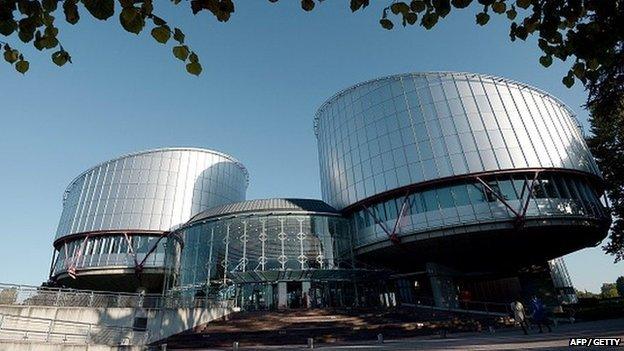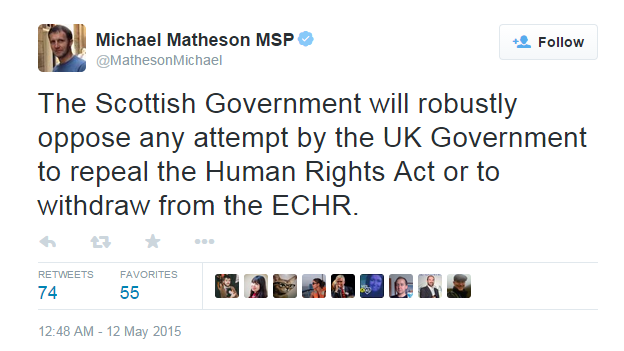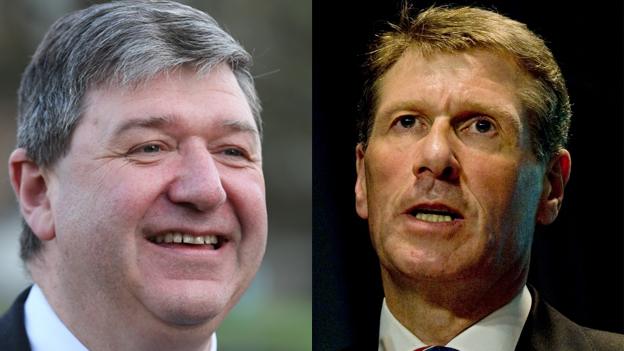Governments in Human Rights Act row
- Published

The Conservative government wants to give UK courts the final say on human rights issues rather than Strasbourg
UK government plans to scrap the Human Rights Act would apply to Scotland, the new Scottish secretary has said.
But the Scottish government said it would "robustly oppose" withdrawal from the European Convention on Human Rights (ECHR).
The Scotland Act (1998), external states all legislation passed by Holyrood must be compatible with the ECHR.
But David Mundell told BBC Scotland new legislation would apply north of the border.
Speaking on BBC Radio's Good Morning Scotland programme, Mr Mundell said Conservative legislation to replace the Human Rights Act with a British Bill of Rights would be UK-wide.
He said: "New legislation replaces existing legislation and therefore the new act will apply in Scotland."
He said people in Scotland shared fears about the influence of the European Court in Strasbourg on the UK.

"I think people in Scotland share the concerns that have been voiced across the United Kingdom - that we've got the balance wrong between rights and responsibilities," he said.
"So what the purpose of the act that we'll be bringing forward is, is to not only enshrine rights but also enshrine responsibilities."
But in a further statement, a spokesman for the Scottish Conservatives said the Scottish Parliament would have a say on the role ECHR where it affects devolved issues.
He said: "As is made clear in our manifesto, the Scottish Parliament will retain the final say on the role of the European Court of Human Rights in relation to issues which fall within its authority. This is part and parcel of our desire to ensure the powers of the devolved Scottish Parliament are respected."
Justice Secretary Michael Matheson said the Scottish government would fight any moves to scrap the Human Rights Act.
In a tweet, he said: "The Scottish Government will robustly oppose any attempt by the UK Government to repeal the Human Rights Act or to withdraw from the ECHR."

Can MSPs block human rights reform?
The Scottish government says it will "robustly" oppose UK government proposals to change human rights laws, but can it block the reforms in Scotland? Constitutional experts say the issue is not clear cut.

The Conservatives want to give UK courts and parliament the "final say" on human rights issues rather than Strasbourg.
Under the plan, the European Courts would not be able to require the UK to change British laws, with its judgements being treated as "advisory" rather than binding.
Instead, the UK's Supreme Court would be "the ultimate arbiter" on human rights matters.
The Human Rights Act came into force in 2000, bringing the rights contained in the European Convention on Human Rights (ECHR) into UK law.
This international treaty - which the UK signed up to after World War Two - created basic human rights and freedoms which every citizen in Europe is entitled to.
Human rights cases can now be heard in UK courts, instead of having to be heard at the European Court of Human Rights in Strasbourg, France.
The Human Rights Act includes the rights to life, liberty and security, a fair trial, respect for private life, and freedom of expression.
Torture, slavery and discrimination are all banned as well.
Critics say the Human Rights Act has led to "perverse" judgements, including a ruling that found the UK's blanket ban on prisoners voting was unlawful.
- Published12 May 2015

- Published3 October 2014
